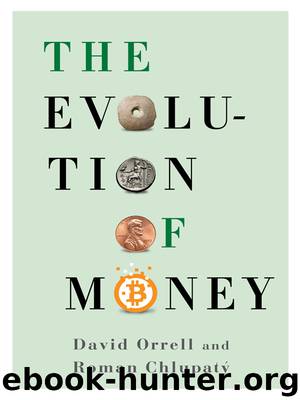The Evolution of Money by David Orrell

Author:David Orrell
Language: eng
Format: epub
Tags: BUS023000, Business & Economics/Economic History, BUS045000, Business & Economics/Money & Monetary Policy
Publisher: Columbia University Press
Published: 2016-06-13T16:00:00+00:00
It’s Alive
In the preface to his Principles of Economics, the neoclassical economist Alfred Marshall wrote that “the Mecca of the economist lies in economic biology.” However, he did not pursue the metaphor very far. He continued, “Biological conceptions are more complex than those of mechanics; a volume on Foundations must therefore give a relatively large place to mechanical analogies, and frequent use is made of the term equilibrium which suggests something of a static analogy.”51
Instead, economists built up a model of the economy in which people or firms acted like inert atoms, deprived of any life or individuality or power relationships or connection with one another. While these assumptions may have seemed reasonable at the time, as mathematical simplifications, they have found less use in life sciences such as biology and ecology. For one thing, living systems show so-called emergent behavior, which means that the macro-behavior cannot be predicted from a knowledge of individuals. An ant colony is not simply a larger version of a single ant, because ants do not behave as atomistic individuals but are embedded in a complex social organization, are in constant communication with one another, develop specialized roles, experience group dynamics, and so on. The same can be said, on a grander scale, of the human economy. When people are seen as living beings that are part of larger groups (families, communities, nations, etc.), it makes no sense to describe their behavior in terms of static utility functions, because their preferences will change with time and context.
Nor are living systems homogeneous. As Charles Darwin knew, diversity, along with competition, is one of the drivers of evolution. If everything were the same, “survival of the fittest” would result in a draw and nothing would change. The same dynamic explains why markets are often dominated by a small number of successful firms, instead of a large number of essentially indistinguishable firms as assumed by neoclassical economics. The result of this evolutionary process is not equilibrium, but a state of dynamic change and continuous adaptation. And while competition plays an important role, so does cooperation. Diversity means that people and firms can often do more when they function as part of a team than they can individually. Ecological niches appear as a result. In this world, money is not an inert placeholder or a passive lump of metal, but a vital, active medium that circulates through the economy, changing it as it goes (box 7.2).
Download
This site does not store any files on its server. We only index and link to content provided by other sites. Please contact the content providers to delete copyright contents if any and email us, we'll remove relevant links or contents immediately.
| Accounting | Economics |
| Exports & Imports | Foreign Exchange |
| Global Marketing | Globalization |
| Islamic Banking & Finance |
50 Economics Classics by Tom Butler-Bowdon(2073)
Six Billion Shoppers by Porter Erisman(2005)
Why Nations Fail: The Origins of Power, Prosperity, and Poverty by Daron Acemoglu & James Robinson(1796)
No Time to Say Goodbye(1769)
The Economist [T6, 22 Thg9 2017] by The Economist(1652)
Red Notice by Bill Browder(1603)
Currency Trading For Dummies by Brian Dolan(1557)
Thank You for Being Late by Thomas L. Friedman(1460)
Bitcoin: The Ultimate Guide to the World of Bitcoin, Bitcoin Mining, Bitcoin Investing, Blockchain Technology, Cryptocurrency (2nd Edition) by Ikuya Takashima(1426)
Amazon FBA: Amazon FBA Blackbook: Everything You Need To Know to Start Your Amazon Business Empire (Amazon Empire, FBA Mastery) by John Fisher(1309)
The Great Economists by Linda Yueh(1188)
Coffee: From Bean to Barista by Robert W. Thurston(1188)
The Future Is Asian by Parag Khanna(1178)
Pocket World in Figures 2018 by The Economist(1158)
Capitalism Without Capital: The Rise of the Intangible Economy by Jonathan Haskel(1132)
Grave New World by Stephen D. King(1113)
How Money Got Free: Bitcoin and the Fight for the Future of Finance by Brian Patrick Eha(1112)
The Sex Business by Economist(1090)
Cultural Intelligence by David C. Thomas(1015)
